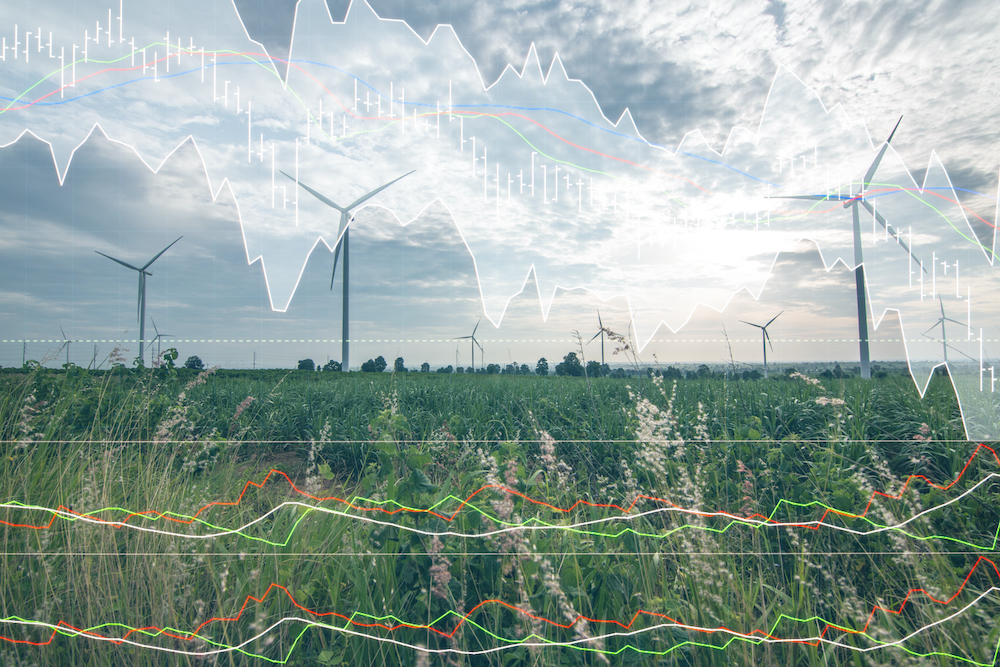ImpactAlpha, Jan. 7 – The table was set with last year’s flows of capital into sustainable funds, renewable energy ‘SPACs,’ community development financial institutions and initiatives to redress racial injustice. This year, investors are expecting a feast of opportunities for progress, not only on pandemic relief, but on climate action, racial justice and inclusive prosperity as well.
In the U.S., impact and sustainable investors are expecting policy tailwinds from a new congressional majority and a new U.S. administration – yesterday’s chaos notwithstanding. Agents of Impact shared their ideas of what lies ahead on ImpactAlpha’s recent Call (see, “What Agents of Impact are expecting in 2021”).
The challenge now is for thinking big enough to match the moment, as this roundup of forecasts from investors, economists and other experts suggests.
1. Financial institutions are optimizing for sustainability. In Outlook 2021, Bloomberg News rounds up more than 500 key calls from global investors. “After a year that made a mockery of every best-laid investment plan, the prognosticators of Wall Street could be forgiven for greeting 2021 with an abundance of caution,” writes Bloomberg’s Sam Potter. “Instead if there’s an oversupply of anything, it’s optimism. Among them:
- Sustainability realignment. “The pandemic has added fuel to pre-existing structural trends such as an increased focus on sustainability, rising inequality within and across nations, and the dominance of e-commerce at the expense of traditional retail,” says BlackRock Investment Institute. “We prefer sustainable assets amid a growing societal preference for sustainability.” Fidelity expects ESG and climate funds that have outperformed conventional funds throughout 2020 “are likely to continue to do so in 2021.” BNP Paribas “expects the year to be marked by increased transparency in climate objectives and disclosures of corporates and financial institutions, as well as a rapid acceleration in sustainable products and investment.”
- Climate action agenda. President-elect Biden’s climate plans, as well as Europe’s green new deal, “should see environment-related industries such as clean energy outperform,” says Pictet. Capital flows into ESG funds should continue to grow, says Societe Generale. “The U.S. re-joining the Paris climate accord should drive even faster and deeper greening of portfolios.” Lombard Odier is favoring “companies developing new technologies while working to tackle climate change, preserving nature and increasing bio-diversity.” Climate technology will “benefit from rising climate commitments,” says DWS. “Investors may need to prepare themselves for a transition to net zero emissions across economies faster than expected,” says HSBC Asset Management.
2. Declining costs and cheap capital are propelling climate solutions to scale. “Technology deployment – not more R&D – leads to lower costs,” argues Generate Capital’s Jigar Shah. The San Francisco firm last year raised a $1 billion fund for sustainable infrastructure-as-a-service. “The technology is ready, our infrastructure is old, and everyone seems to understand that clean energy is our way to full employment,” Shah says. Follow the talent: “Everyone now sees climate solutions as a place to build a lasting career in the 21st century,” Shah says.
3. Climate competition is heating up. “As the US scrambles to catch up to China in what will quickly become a global clean energy arms race, it will make climate and the energy transition a matter of industrial and national security policy,” write Eurasia’s Group’s Ian Bremmer and Cliff Kupchan. Put another way: net zero meets G-Zero (a world in which no one country has political and economic dominance). Among the firm’s top risks for 2021: companies that “focus only on net zero and not on G-Zero.”
4. Institutional and retail investors are shifting public markets toward ESG. More than $168 billion poured into global environmental, social, and governance, or ESG, funds in 2020. That trend is accelerating, according to Nasdaq, which calls ESG “one of the hottest trends” of the new year. Driving the growth: ESG’s popularity among younger investors and asset managers such as BlackRock that are making ESG a central theme.
- Top-down pressure. ESG went mainstream in 2020. ”In 2021, it will dominate,” writes Russell Reynolds Associates’ Kurt Harrison. “C-suites and boards around the world will feel the pressure to embrace ESG across the organization,” he says, as trillion-dollar asset managers increasingly support shareholder resolutions (as Legal & General has done and Blackrock has pledged).
5. Tech leaders are on the hook for diversity investments. The Plug’s Sherrell Dorsey tracked tech firms that committed to diversity in investment and recruitment as last summer’s racial justice protests played out. “We predict that these commitments will be the leading topic of discussion across this year’s business leadership climate in all sectors,” writes The Plug’s Monica Melton. Also watch: The rise of the Black tech worker movement.
6. Emerging-market companies are emerging as sustainability leaders. “Global sustainability commitments should provide a tailwind to emerging market companies that are developing products and services that contribute to low-carbon goals,” Cartica’s Kate Ahern told ImpactAlpha. Domestic and global wind, solar, and electric vehicle industries, she said, are well-positioned as commitments under the Paris climate agreement are translated into regulation and action.
7. Global development is going local. Around the globe, power is shifting. In emerging markets, that could finally put more funds into the hands of local groups closest to communities (see, “Helping small businesses in emerging markets survive and thrive in 2021”). “It’s become easier to identify credible local organizations and fund them directly,” writes Devex’s Raj Kumar. He envisions Mackenzie Scott-style private philanthropy in lower-income countries and new initiatives that advance localization. Also key: energy access and internet connectivity.
8. Investors are recognizing that gender is material. The pandemic highlighted the many ways gender inequality affects how companies, sectors and markets perform (see “From workforce to infrastructure, 10 ways gender is ‘material’ to the COVID recovery”). Investors who want to deploy their capital smartly in 2021, writes GenderSmart Investing’s Suzanne Biegel, “would do well to invest in women-led businesses, economies with higher rates of women’s participation in the workforce, and businesses that are paying attention to the gendered impacts of unpaid care, remote work, and gender-based violence.”
9. Accountability for impact could trip up some ESG darlings. Seabreeze Partners Management’s Doug Kass, for example, expects Tesla, a staple of ESG funds (and now the S&P 500) that added more than $500 billion in market value last year, to lose its luster and its lofty share price. Kass expects Tesla’s stock price to fall by two-thirds. A truckload of competition in the electric vehicle space is one danger. Another: Tesla’s less than stellar record on the “S” and “G” aspects of ESG. Kass imagines Vanguard’s John Bogle “rolling over in his grave as ‘passive’ investors lose most of their ‘investment’ in Tesla.”
10. As investors go ‘impact on,’ they are going to ImpactAlpha. SVX Mexico’s Laura OrtizlistsImpactAlpha No. 2 among her recommendations for resources for impact investing and the regenerative economy in Latin America. “The Brief is the quintessential tool for the impact investing network,” she says. ”ImpactAlpha is part of my staple diet since 2014 and every year I love it even more” (see, “When investors go ‘impact on,’ they go to ImpactAlpha”). Ortiz’s rich roundup illuminates a growing collection of networks and events. She concludes, “May 2021 bring an avalanche of impactful action to apply all this shared wisdom” Hear! Hear!











